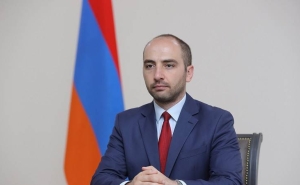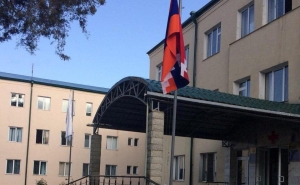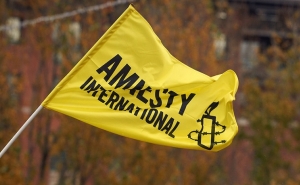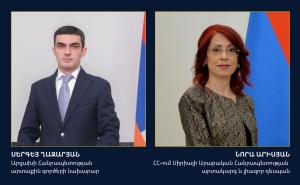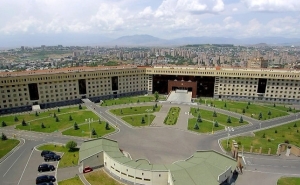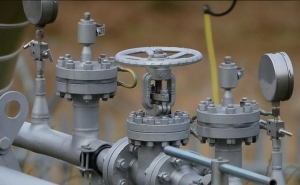 The Situation in NKR: Who Started the First?
The Situation in NKR: Who Started the First?

The first large-scale resumption of military actions since the conclusion of a trilateral agreement on ceasefire between Armenia, Azerbaijan and Karabakh in 1994 continues. Calling it as usual "violation of truce" is not relevant anymore. Despite the fact that many avoid using the term "war", in other words it is impossible to fully describe the situation. In the zone of conflict military air forces, all kinds of artillery and armored vehicles are being used, civilian settlements are under fire, women and the elderly are being killed. For a large-scale war – according to international definition of this word - the use of long-range missiles is only left.
At the same time it should be noted that the war is between the Nagorno-Karabakh Republic and Azerbaijan, and official Yerevan has not yet intervened into the developments. At the same time there is a large flow of Karabakh war veterans, voluntarily going to the front in Karabakh (according to the latest data, the number already exceeds 4 thousand).
The first Deputy Defense Minister of Armenia David Tonoyan during a meeting with military attaches of diplomatic missions of foreign countries in Armenia noted that the Armenian side is ready for any development of events, if necessary even to give direct military support to NKR. Moreover, the President of Armenia Serzh Sargsyan on April 2 during the meeting of the National Security Council ordered to prepare an agreement on mutual military assistance between Armenia and Nagorno-Karabakh Republic, which on the one hand will raise the bilateral relations to a new level, on the other hand will even more legalize the basis for giving military assistance to NKR.
Following this unpredictable escalation, especially from the outside, the question "who started first?"is quite interesting. The fact that recently violations of the ceasefire on NKR-Azerbaijani and Armenia-Azerbaijani borders have become quite frequent, is not something new and no matter how strange it may sound, they have become quite common. For these violations the sides blame each other. However, this time, as already mentioned, we are dealing with a different situation, and in order to point out the ventures, that provoked a new war, one should deeply look at some factors and motives of the parties.
Armenia, being a party to the negotiations on the settlement of the conflict and feeling the effects of the Azerbaijani-Turkish blockade on its own economy is more than interested in the peaceful settlement of the Karabakh problem. The resumption of military actions, given their cost and unpredictability, is not in the interests of Armenia. Even the relative peace in Karabakh for Armenia is preferable to any military action.
The possibility of resumption of full-scale war by the Nagorno-Karabakh Republic, too, does not seem to be plausible, given the limited resources and the prospect of immediate physical danger of its own citizens. In addition, Nagorno-Karabakh Republic, despite non-recognition and Azerbaijani blockade, develops quite effectively and to jeopardize this development without a guarantee of success is illogical.
The decision of Baku to resume large-scale military actions is simultaneously conditioned by several factors. The motives of Azerbaijan are quite diverse. Let’s refer to some of them:
-
 17:08
17:08The regular session of the Anti-corruption Policy Council takes place in Jermuk
-
 15:05
15:05The Prime Minister sends congratulatory messages to the supreme leader of Iran and the President of Iran
-
 11:11
11:11Armenia sends earthquake aid to Turkey
-
 10:43
10:43Commemoration of the Pontiff St. Sahak Partev
-
 09:16
09:16Some roads are closed and difficult to pass in Armenia
-
 19:55
19:55Phone conversation of the Foreign Minister of Armenia with the U.S. Assistant Secretary of State for European and Eurasian Affairs
-
 18:30
18:30Prime Minister Pashinyan and President Khachaturyan meet
-
 18:20
18:20Ararat Mirzoyan with Co-Chairman of the OSCE Minsk Group of France Brice Roquefeuil
-
 17:01
17:01Humans could land on Mars within 10 years, Musk predicts
-
 16:45
16:45France, US urge 'immediate' end to Nagorno Karabakh blockade
-
 16:01
16:01Blockaded Nagorno Karabakh launches fundraiser to support quake-hit Syria
-
 15:59
15:59Earthquake death toll in Turkey rises to 18,342
-
 15:43
15:43Ararat Mirzoyan Held a Telephone Conversation with Sergey Lavrov
-
 15:06
15:06French president rules out fighter jet supplies to Ukraine in near future
-
 14:47
14:475 Day Weather Forecast in Armenia
-
 14:44
14:44President Vahagn Khachaturyan wrote a note in the book of condolences opened in the Embassy of Syria in Armenia
-
 14:20
14:20Azerbaijan’s provocations impede establishment of peace and stability – Armenian FM tells Russian Co-Chair of OSCE MG
-
 12:57
12:57France representation to OSCE: Paris calls on Azerbaijan to restore freedom of movement through Lachin corridor
-
 11:40
11:40Command of Kosovo forces highly appreciated preparation of Armenian peacekeepers
-
 10:16
10:16The United States withdrew from sanctions against Syria for six months the provision of assistance after the earthquake
day
week
month
Humidity: %
Wind: km/h




